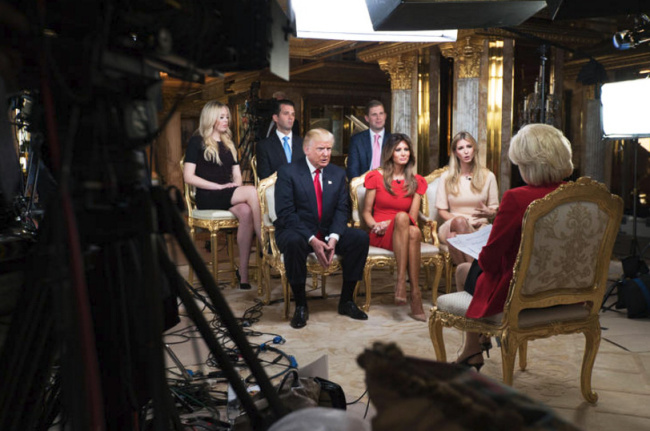November 18, 2016
by Warren L. Nelson

In his first week as presidentelect, Donald Trump has side-stepped the issue of Iran and given no hint what he will do.
Many news reports say Trump promised to “tear up” the nuclear agreement. But he never said that. Many of his opponents for the GOP nomination made that pledge, but Trump was the odd man out saying he would re-negotiate the agreement.
He has never explained how he could re-negotiate the agreement if Iran didn’t want to renegotiate it—and Iran doesn’t.
But he did observe that most of the benefits Iran would get out of the agreement—which he said was billions of dollars in cash, not the lifting of sanctions—would already be in Iran’s hands before he ever became president, suggesting there was nothing to be done about the deal.
A number of foreign policy insiders think Trump will ignore the nuclear agreement and instead propose new sanctions on Iran for human rights violations, missile work and other policies. The nuclear agreement permits new sanctions, as long as they aren’t for nuclear work.
A key question, however, is whether Trump can legally back out of the agreement. The State Department says yes. The EU says no.
The State Department said the deal is an executive agreement, not a treaty, and, therefore, a new president can pitch it overboard—though it says there would be painful consequences if Trump did so.
The EU points out that the agreement negotiated by the Big Six was adopted by the UN Security Council as a binding resolution and, thus, the United States cannot legally walk away from it.
At the State Department last week, spokesman Mark Toner was asked about the agreement. He said:
“Any party—and I’m speaking very hypothetically here, because I don’t want in any way to attempt to hypothesize about what the incoming administration’s going to do—I’m just talking purely about an agreement that any party can walk away from. And that will have profound consequences on the integrity of the agreement.”
Toner said the Iran deal was not a legally binding treaty, but that the current US administration believes it is in Washington’s interest to continue it.
Asked whether, if the US withdraws support for the deal, Iran might start building nuclear weapons, Toner said: “Yes. That’s the reality of the situation.”
In Brussels, the EU’s foreign policy chief, Federica Mogherini, had a contrary view.
“The Iranian nuclear agreement is not a mutual deal between Iran and the US, but a multilateral agreement, which I am still responsible for as the chairman of the joint commission to supervise the full implementation of the nuclear agreement by all sides,” Mogherini said during an interview with CNN.
“The nuclear deal is [done] in the framework of the UN Security Council; [it is] not a bilateral or national issue.”
(European commentators generally say Europe’s foreign ministers were more concerned about Trump’s policy on Russia than Iran, since Russia’s poses the major challenge for Europe right now.)
Of course, others, like Israel and Saudi Arabia, might urge Trump to kill the Iran deal.
But Israeli Prime Minister Binyamin Netanyahu has maintained stoic silence since Trump won the election.
And, while Saudi Arabia has been officially silent, a former Saudi ambassador to Washington says Trump should leave the deal as it is but come down hard on Iran’s “destabilizing activities” in the Middle East.
Prince Turki al-Faisal, a former Saudi intelligence chief as well as ex-ambassador to Washington, said last Thursday:
“I don’t think he should scrap it. It’s been worked on for many years and the general consensus in the world, not just the United States, is that it has achieved an objective, which is a 15-year hiatus in the program that Iran embarked on to develop nuclear weapons.
“To scrap that willy-nilly, as it were, will have ramifications, and I don’t know if something else can be put in its place to guarantee that Iran will not go that route if the agreement is scrapped.
Prince Turki said he would like to see if the deal could become a “stepping stone” to a more permanent program “to prevent proliferation through the establishment of a zone free of weapons of mass destruction in the Middle East.”
Prince Turki also said Trump should admonish Iran for its “very adventurous and very destabilizing activities” in the Middle East.
“I would like to see President Trump marshal American public opinion and American government activity to challenge that view of Iran that it can license itself to interference,” he said.
Prince Turki does not hold any official position in the Saudi leadership now, and he emphasized that he was speaking in a personal capacity.
Walid Phares, one of Trump’s foreign policy advisers, last week said the president-elect is going to demand changes to the nuclear agreement.
“’Ripping up’ is maybe a too strong of a word. He’s going to take that agreement—it’s been done before in international context—and then review it,” Phares said on BBC radio last Thursday.
“He will take the agreement, review it, send it to Congress, demand from the Iranians to restore few issues or change few issues, and there will be a discussion. It could be a tense discussion, but the agreement as is right now—$750 billion to the Iranian regime without receiving much in return and increasing intervention in four countries—that is not going to be accepted by a Trump Administration,” he said.
But Trump’s advisers have frequently said things in the past that Trump has reversed. The world will have to wait for Trump to announce what he will do with regard to Iran.
